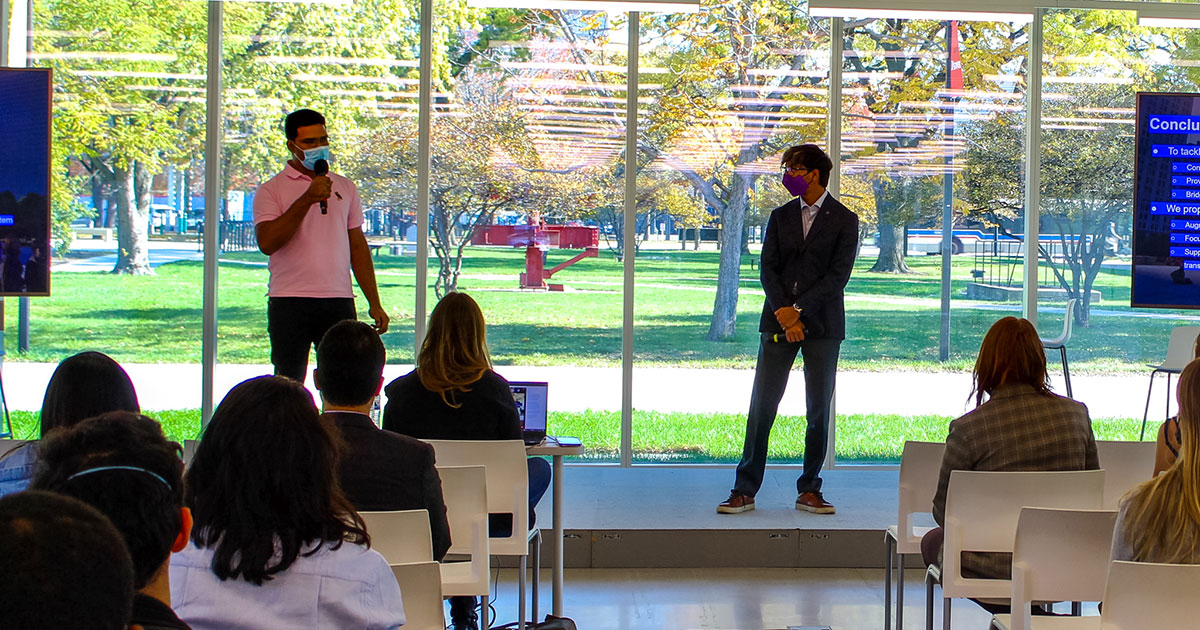MEM Student Competes to Build a Stronger Chicago
Raghu Veer (MEM ‘22) and his team placed second in ThinkChicago’s Civic Tech Challenge after conceptualizing a one-stop app for the city's services and resources.

Raghu Veer (MEM ‘22) is passionate about using technology to help make a difference in society. Because of the COVID-19 pandemic, he saw this need is more important than ever.
"The COVID-19 pandemic has affected everything from how businesses operate to how people use public transportation to how citizens access mental health resources," Veer said. "These changes have revealed and exacerbated existing social and economic inequities, and many of the worst impacts of the pandemic have been concentrated in already disadvantaged communities."
Veer recently competed in ThinkChicago’s Civic Tech Challenge, a competition where students pitch new concepts for combining technology with civic government needs. The theme of the competition was "Forward Together: Building a Stronger Chicago."
Teams were tasked with addressing one of five priority areas for the City of Chicago as identified by Mayor Lori Lightfoot’s Recovery Taskforce. Those priorities were:
- Address new and old traumas
- Expand economic opportunity, quality employment, and financial security
- Build on our region’s strengths
- Capture opportunities created by COVID-19
- Reignite activity throughout Chicago by sharing our story
Veer's team focused on reigniting activity throughout the city, and took second place in the competition for its concept, the Chicago One-Stop app.
Chicago One-Stop would provide Chicago residents and tourists with one application that connects them with all Chicago services and resources. The app engages city stakeholders and addresses three issues facing local government: social justice, drops in tourism, and the lack of communication between city officials and their constituents.
Because websites and social media platforms fragment communication, Chicagoans do not have a single channel for connecting when it comes to community matters, Veer said. This limits the impact of available resources, policies and community programs, and exacerbates social inequities.
“A unified platform ensures horizontal and vertical stakeholder communication,” Veer said. “We wanted to address all the problems Chicago was facing, and we wanted to do it in one place.”
The proposed app would include a centralized feed for community members to ask questions and communicate directly with city officials, businesses and local experts. It also would include tools helpful to visitors, like a mobile vaccination passport, augmented reality experiences at Chicago landmarks, and opportunities to ask a Chicagoan for tips.
Veer relied on his experience in Northwestern Engineering's Master of Engineering Management (MEM) program. MEM enhances students’ management and leadership skills while deepening their understanding of emerging and traditional technologies. Students strengthen their knowledge base while learning to communicate not only what a piece of technology does, but the impact it could have on an organization.
“I was able to leverage [MEM coursework] to propose a solution to solve problems in Chicago at scale,” Veer said.
In addition to his team's project, Veer networked with guest speakers and students from across the city. The experience was valuable for Veer, and more than anything, it reiterated the importance of working together toward a common goal.
“Even though we come from different walks of life, we all should be able to give back to the community," Veer said, "improving the overall quality of life for everyone.”

